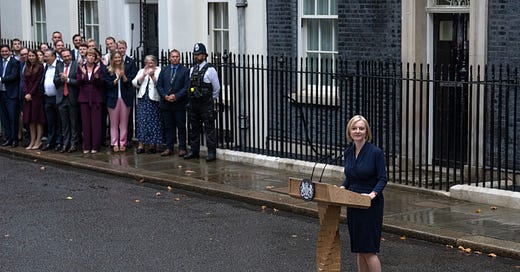(Photo by Carl Court/Getty Images)
On the day that Boris Johnson resigned I wrote: “I don’t think any of the prospective candidates will be as bad as Johnson. I really hope no other Prime Minister in my lifetime will be.” Liz Truss wouldn’t have been my pick of those candidates but I still believe this to be true. Johnson never had any kind of agenda or plan beyond personal aggrandisement. He had little to no interest in policy, and had no compunction about saying whatever it was that he thought people wanted to hear regardless of its relationship to reality.
Truss is different. She will at least try to prioritise, will work ferociously hard, and will take real and detailed interest in policy challenges. She also has her own weaknesses. She’s an extremely poor communicator both in formal speeches and interviews. Johnson never communicated anything useful but his bluff, jokey, style got him through most encounters. Her initial statements to the public have been flat, platitudinous and awkward. She’s also too taken by the idea of being iconoclastic and outside the consensus, which means she can stick to positions that aren’t supported by the evidence. A Times profile of her last week featured an anecdote from David Laws, who was a Lib Dem minister at the education department when she was there:
“Promoted to the role of junior minister in the Department for Education in 2012, Truss continued to push her ideas in government, but she was met with bemusement from civil servants and obstinacy from the Liberal Democrats. On one occasion Truss instructed officials to omit data from a consultation paper that would undermine her central argument about teachers being restricted to care for fewer children because of red tape.
‘The civil servants obviously found her quite a handful,’ David Laws, a former schools minister who worked alongside Truss, says. ‘Apparently, she told them to delete all the countries that were on the wrong side of the UK and publish a chart that showed us as an outlier to reinforce her argument. She is quite ideological and has a reasonably clear philosophy around competition, free markets and low taxes. The downside of that is she is not always as interested at looking at the evidence.’”
This is indicative and will prove a big problem for her unless she learns to be more open-minded. That said she seems to have been flexible enough with her first big test: the initial announcement on energy bills, which is due tomorrow. From piecing together different briefings it seems that, after exploring and discarding pretty much every other option, she is going to end up adopting a variant of the Labour/Lib Dem plan from the summer – a fixed cap on energy costs paid for by borrowing, for both households and businesses (and the public sector). As Truss still intends to do her promised tax cuts, the costs, as I discussed in my post on what next year might look like, are getting eye-watering, and starting to cause nervousness in the markets. The cost of Government borrowing has been rising all month, which creates a negative loop.
The energy plan will provide much needed reassurance on the cost of living over the winter, and has the benefit of holding down inflation, but it also means there is less incentive for households and businesses to cut use, increasing the risk of rationing. So there will be plenty more thinking to do after the first announcement is out of the way.
While we have to wait for the details of the plan we do now have confirmation of the cabinet. The rest of this post will focus on the strengths and weaknesses of the new top team and what it tells us about how Truss intends to govern.
Keep reading with a 7-day free trial
Subscribe to Comment is Freed to keep reading this post and get 7 days of free access to the full post archives.




